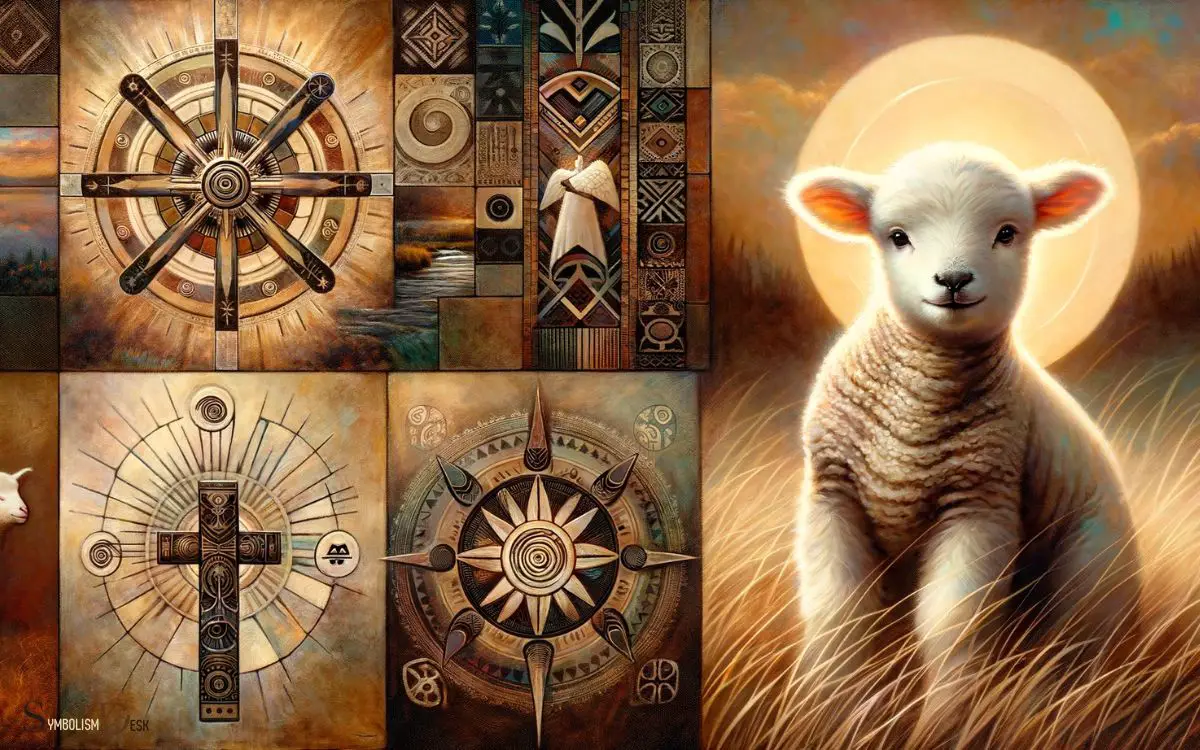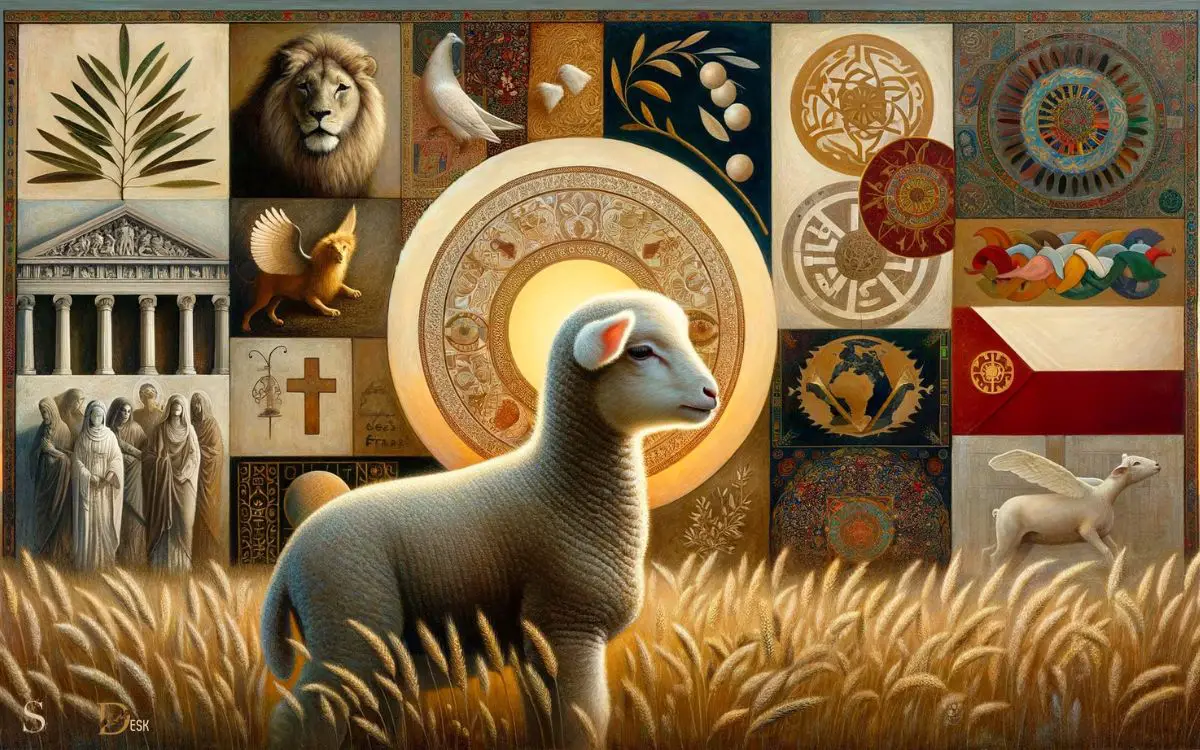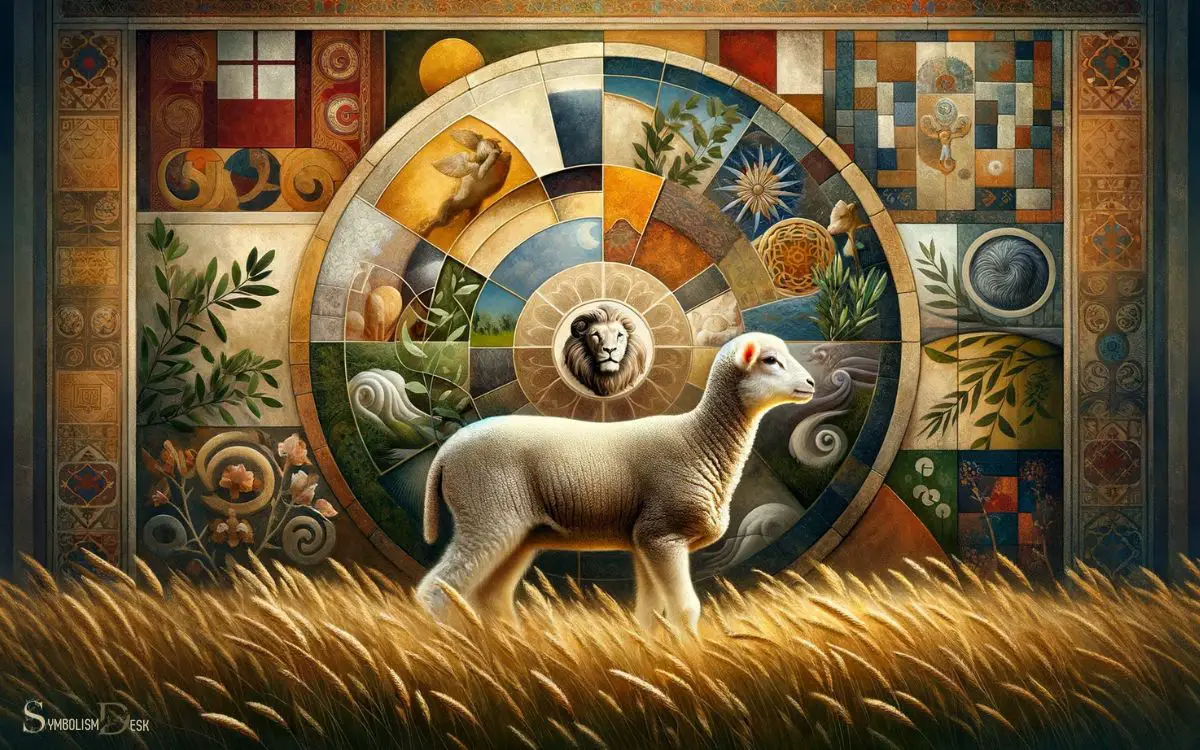What Is the Symbolic Meaning of a Lamb? Purity!
The lamb is a universal symbol of innocence, purity, and sacrifice. Its symbolic meaning is deeply rooted in various cultures and religious doctrines, serving as an emblem of gentleness and non-threatening behavior.
In Christianity, the lamb is often associated with Jesus Christ, known as the ‘Lamb of God,’ representing His sacrificial death for humanity’s sins. Similarly, in other traditions, lambs are seen as embodiments of peace and tranquility.
The lamb’s symbolic meanings include:
- Innocence: Lambs are frequently associated with children and purity due to their gentle nature.
- Purity: Their white fleece is often linked to cleanliness and moral impeccability.
- Sacrifice: Historically, lambs were used in sacrificial rites, symbolizing surrender and redemption.
- New Beginnings: In some contexts, lambs symbolize spring and renewal.
For example, during the Jewish Passover, a lamb’s sacrifice commemorates the liberation from Egypt, while in Christianity, the Paschal Lamb represents Christ’s sacrifice.
The lamb, as a symbol, permeates human culture, evoking sentiments of tenderness and divine sacrifice.

8 Symbolic Meanings of a Lamb
| Symbolic Meaning | Explanation |
|---|---|
| Innocence | Lambs are often seen as symbols of purity and innocence. |
| Sacrifice | In religious contexts, lambs symbolize sacrifice and atonement. |
| Gentleness | Their gentle and docile nature represents meekness and humility. |
| Christlike | In Christianity, the Lamb of God symbolizes Jesus Christ. |
| Resurrection | Lambs can symbolize rebirth and resurrection. |
| Passover | In Jewish tradition, lambs are connected to the Passover story. |
| Fertility | In some cultures, lambs represent fertility and abundance. |
| Protection | They can also symbolize protection and a guardian spirit. |
Key Takeaway
Religious Symbolism

The lamb holds significant religious symbolism across various faith traditions, representing innocence and sacrifice.
In Christianity, the lamb is a powerful symbol often associated with Jesus Christ, referred to as the ‘Lamb of God.’ This symbolizes Jesus’ innocence and ultimate sacrifice for humanity’s sins.
In Judaism, the Passover lamb signifies deliverance and redemption, reminding believers of the Israelites’ liberation from slavery in Egypt.
Additionally, in Islam, the lamb is linked to the story of Prophet Ibrahim’s willingness to sacrifice his son Isma’il as an act of obedience to God. This act of substitution, where a lamb was offered instead, symbolizes God’s mercy and provision.
Across these faiths, the symbolic meaning of the lamb reflects themes of purity, atonement, and divine grace.
Cultural Significance

The cultural significance of the lamb is deeply rooted in religious traditions and practices. It represents sacrificial connotations in many cultures, symbolizing purity, innocence, and peace.
Understanding its cultural significance can shed light on the various interpretations and importance of the lamb symbol across different societies.
Religious Sacrificial Connotations
A significant aspect of the symbolic meaning of a lamb lies in its role as a sacrificial animal in various religious traditions.
The act of sacrificing a lamb holds deep cultural and religious significance, representing atonement, purification, and the offering of one’s best to a higher power.
In Christianity, the lamb is a powerful symbol of Jesus Christ, who’s often referred to as the ‘Lamb of God’ and is seen as the ultimate sacrificial lamb whose death redeemed humanity. Similarly, in Judaism, the Passover sacrifice of a lamb symbolizes deliverance and protection.
The sacrificial connotations of the lamb underscore the solemnity and reverence associated with its symbolism, emphasizing the profound spiritual and moral implications it carries.
This sacrificial significance leads into the subsequent discussion about the lamb’s representation of innocence and purity.
Innocence and Purity
Representing purity and innocence in various cultures, the symbolism of a lamb holds deep cultural significance.
- Christianity: In Christianity, the lamb is a symbol of Christ’s purity and sacrificial nature, representing his role as the ‘Lamb of God’ who takes away the sins of the world.
- Judaism: The Passover lamb symbolizes innocence and is used as a sacrificial offering, reminding Jewish people of the importance of purity and obedience to God.
- Islam: In Islamic tradition, the sacrifice of a lamb during Eid al-Adha symbolizes purity, obedience, and willingness to submit to the will of Allah.
- Ancient Cultures: In ancient Greek and Roman cultures, lambs were often used as sacrificial offerings to various gods, symbolizing the innocence and purity required in appeasing deities.
These cultural associations highlight the universal recognition of the lamb as a powerful symbol of innocence and purity.
Symbol of Peace
Symbolizing harmony and tranquility across cultures, the lamb embodies a powerful symbol of peace. In various societies, the lamb represents a universal message of non-violence and serenity.
Its gentle and docile nature has made it a timeless emblem of peace, often associated with concepts of calmness, reconciliation, and goodwill.
The cultural significance of the lamb as a symbol of peace is evident in various traditions and belief systems, where it is revered for its ability to evoke a sense of harmony and unity.
Below is a table highlighting the cultural significance of the lamb as a symbol of peace in different parts of the world:
| Culture | Symbolism |
|---|---|
| Christian | Sacrificial peace |
| Islamic | Peace and purity |
| Ancient Greece | Symbol of tranquility |
Sacrificial Symbolism

Sacrificial symbolism holds significant meaning in various religious and cultural contexts. The symbolic representation of lambs as sacrificial animals can be traced back to biblical times, where they were used as offerings to atone for sins.
This symbolism has permeated different cultures and continues to hold deep spiritual and symbolic significance.
Religious Significance of Lambs
Lambs are often used in religious symbolism as a representation of innocence and purity, frequently being associated with sacrificial rituals.
In various religious traditions, the lamb holds significant religious importance, particularly in the context of sacrificial symbolism:
- Atonement: Lambs are often used as sacrificial offerings to atone for sins or to seek forgiveness in religious practices.
- Symbol of Christ: In Christianity, the lamb is a symbol of Jesus Christ, representing his innocence and ultimate sacrifice for the redemption of humanity.
- Passover Symbolism: In Judaism, the Paschal lamb symbolizes the sacrifice made during the Passover and the deliverance from slavery in Egypt.
- Spiritual Cleansing: The act of sacrificing a lamb symbolizes the cleansing of the soul and the removal of sins in various religious ceremonies.
The religious significance of lambs in sacrificial symbolism underscores their enduring symbolic importance in various faith traditions.
Biblical Sacrificial Symbolism
In biblical sacrificial symbolism, an ancient practice involving animals is depicted as an integral aspect of religious rituals and beliefs. The act of sacrifice, as portrayed in the Bible, holds significant symbolic meaning.
It represents atonement for sins, reconciliation with God, and the concept of substitution, where the animal takes the place of the sinner.
This sacrificial system was a central element of Israelite worship, emphasizing the seriousness of sin and the need for redemption.
The ultimate manifestation of this symbolism is found in the New Testament, where Jesus Christ is likened to the sacrificial lamb whose death brings salvation and forgiveness of sins to humanity.
Through this lens, biblical sacrificial symbolism conveys profound spiritual truths and serves as a foundational concept in understanding the Christian faith.
Cultural Representations of Lambs
Cultural representations of lambs in various societies often embody sacrificial symbolism, reflecting themes of innocence, purity, and spiritual significance. Throughout history, lambs have held symbolic importance in many cultures as a representation of sacrifice and atonement.
Here are some notable cultural representations of lambs:
- Ancient Greece: In ancient Greek mythology, lambs were often used as sacrificial offerings to the gods, symbolizing purity and the need for spiritual cleansing.
- Judaism: The Passover tradition includes the sacrifice of a lamb, symbolizing deliverance and freedom from oppression.
- Christianity: The concept of Jesus Christ as the ‘Lamb of God’ is central to Christian theology, representing the ultimate sacrificial offering for the redemption of humanity.
- Islam: In Islamic tradition, the sacrifice of a lamb during Eid al-Adha symbolizes obedience to God and the willingness to make sacrifices for spiritual growth.
Innocence and Purity
Associated with purity and innocence, the symbolic meaning of a lamb is deeply rooted in various cultural and religious traditions. In Christianity, the lamb is a representation of Jesus Christ, often referred to as the ‘Lamb of God’, symbolizing his pure and sacrificial nature. In many other cultures, the lamb represents fertility, renewal, and new beginnings. It is also often seen as a gentle and docile creature, embodying qualities of meekness and humility. In contrast, the dog symbolizes protection and loyalty in many traditions, serving as a symbol of faithfulness and guardianship.
Similarly, in Judaism, the Passover lamb signifies innocence and is an essential part of the Passover feast, representing the Israelites’ deliverance from slavery in Egypt.
Additionally, in ancient Greek and Roman mythology, the lamb is linked to the goddess of fertility and is seen as a symbol of renewal and purity.
This universal association of lambs with innocence and purity emphasizes their significance across different cultures and belief systems.
| Tradition/Culture | Symbolic Meaning of the Lamb |
|---|---|
| Christianity | Representation of Jesus Christ, purity, sacrifice |
| Judaism | Signifies innocence, part of Passover feast |
| Greek/Roman Myth. | Symbol of renewal, purity, linked to fertility goddess |
This widespread symbolism underscores the enduring perception of lambs as embodiments of innocence and purity. This perception transcends cultural and religious boundaries, making the lamb a powerful and universally recognized symbol of these qualities.
This lays the foundation for understanding the broader implications of the lamb’s symbolism, particularly in relation to concepts such as compassion and gentleness.
Compassion and Gentleness
The tender and nurturing nature of a lamb exemplifies compassion and gentleness, embodying these virtues in various cultural and religious contexts.
- Symbol of Peace: In Christianity, the lamb symbolizes the compassionate and gentle nature of Jesus Christ, who’s often referred to as the ‘Lamb of God’ representing peace and grace.
- Cultural Representations: In many cultures, the lamb is seen as a symbol of compassion, often depicted as a gentle and nurturing creature in stories, folklore, and art.
- Animal Welfare: The compassionate and gentle nature of lambs has inspired movements and organizations advocating for the welfare of animals, promoting kindness and empathy towards all living beings.
- Personal Traits: The symbolism of the lamb encourages individuals to cultivate compassion and gentleness in their interactions with others, promoting harmony and understanding in relationships.
This emphasis on compassion and gentleness transitions seamlessly into the subsequent section about ‘spiritual connection’, where the lamb’s symbolic meaning continues to hold significance.
What is the difference between the symbolic meanings of a lamb and a sheep?
The symbolic meaning of sheep is often associated with innocence, gentleness, and purity. On the other hand, a lamb is seen as a symbol of spring, renewal, and new life. While both animals carry similar connotations, the lamb is often linked to more youthful and hopeful symbolism compared to the mature and docile sheep.
Spiritual Connection
The lamb’s symbolic representation of compassion and gentleness extends to its significance in fostering a spiritual connection among believers and practitioners of various faith traditions.
In Christianity, the lamb is often associated with Jesus Christ, who’s referred to as the ‘Lamb of God.’ This symbolizes his sacrificial and redemptive role, creating a profound spiritual connection between Christ and his followers.
Similarly, in Judaism, the Passover lamb symbolizes deliverance and the deep spiritual connection between God and the Jewish people.
In Islam, the concept of sacrifice and spiritual purity is represented by the story of Prophet Abraham’s willingness to sacrifice a lamb.
Across different faith traditions, the lamb serves as a powerful symbol of spiritual connection, reminding believers of compassion, sacrifice, and the divine presence in their lives.
Conclusion
The lamb holds a deep symbolic meaning across various cultures and religions. It represents innocence, purity, and sacrifice, and is often associated with compassion and gentleness.
The image of a lamb evokes a sense of spiritual connection and serves as a powerful symbol of peace and harmony. Its presence in art, literature, and religious ceremonies continues to inspire and uplift, reminding us of the enduring significance of this gentle and beloved creature.






